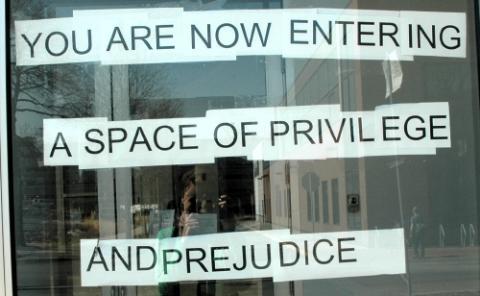It’s pretty common – an activist collective gets together to meet about starting a campaign. Even though the group is relatively diverse, it seems to be that the people who are talking the most are those with considerable privilege. It’s those folks (white, straight, male, rich, able bodied, etc.) that have to make sure that they aren’t falling back in line with the status quo.
North American society is made for the privileged, with the justification that we live in a meritocracy. In reality, there are many different systems of power working to oppress certain groups, depending on what identities they hold.
It’s important for activist groups to break out of this way of thinking and instead make space available for difference and voices that aren’t heard in the mainstream. This guide is all about getting there and includes:
Dos and Don'ts
Catching yourself
Consequences
Do:
-listen actively
-consider how much you're talking
-give others a chance to contribute
-use questions to clarify
-accept constructive feedback
Don't:
-Create a hierarchy of experiences
-Interrupt others
-Be the only person talking throughout the meeting
-Assume what other people are thinking or what they want
-Speak on behalf of groups you don't belong toFor more Dos and Don'ts, check out Dan the Dude.
Catching yourself
Everyone comes with their own unique experiences and perspectives. It can be easy to get stuck in those, but be mindful. When talking, try to use accessible language and analogies. Quoting academic Marxists or philosophies are really only helpful when you can explain what they mean in a way everyone can understand.
There are many other ways to acquire knowledge besides getting up in an Ivory Tower. To avoid sounding like you’re grouping everyone’s experiences with your own, be clear about where you’re coming from. (“As a white queer woman, I’ve had this experience…”) By speaking personally, it’s easier to avoid sounding like you speak for everyone.
Beware of the sneaky gendered division of labour. It’s surprising how often men end up as a facilitators and women end up in charge of coffee and snacks. Try to actively switch these roles by offering training for anyone interested in facilitating.
Consequences
Really, the mistakes that people can make by not checking their privilege are the same kind of mistakes anyone can make in a group discussion. The difference is the context. By falling back into a privileged role, you’re no longer working actively against the very systems responsible for oppression. It can be tricky at first, but gaining awareness and working at taking a back seat in a discussion can make a big difference.




